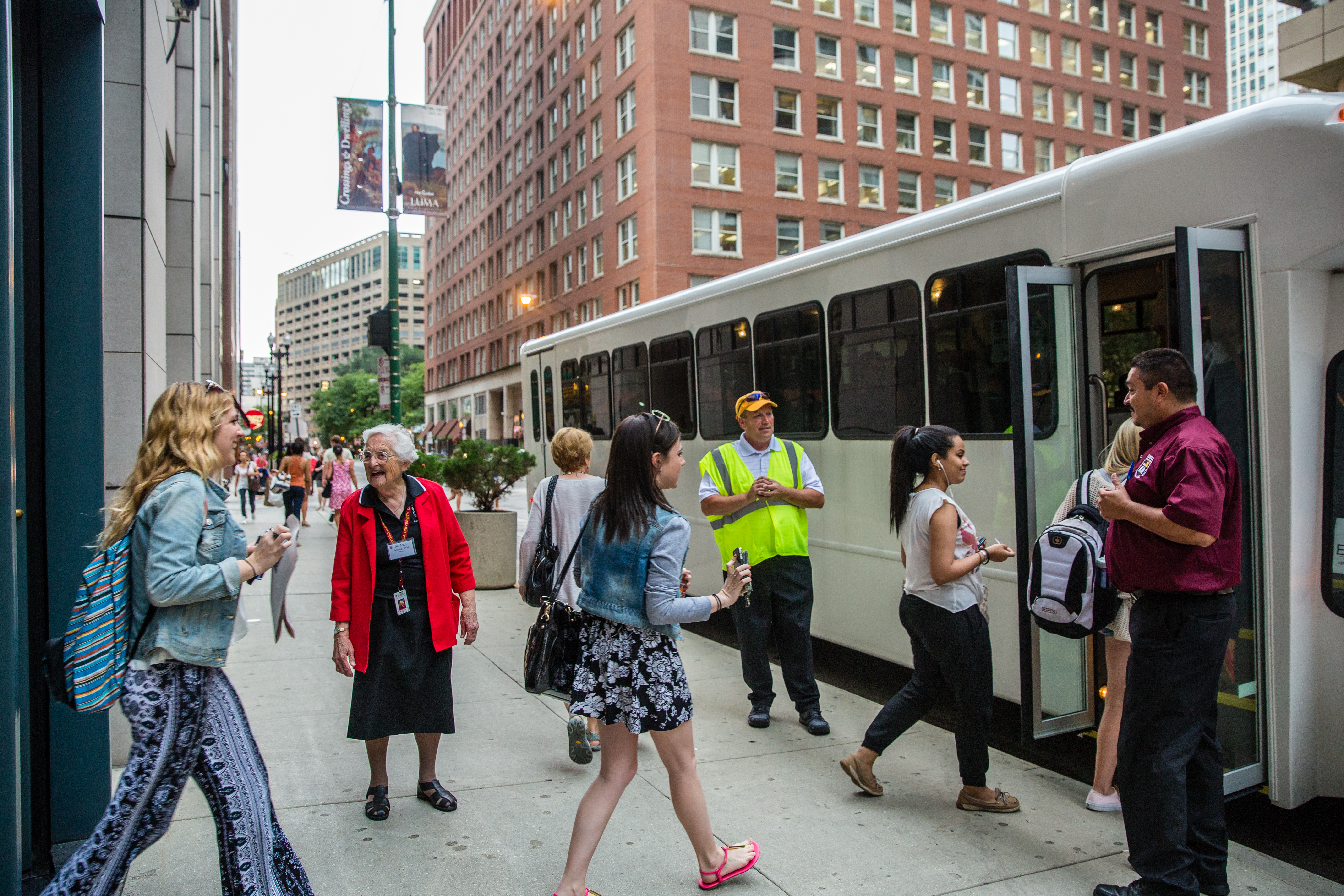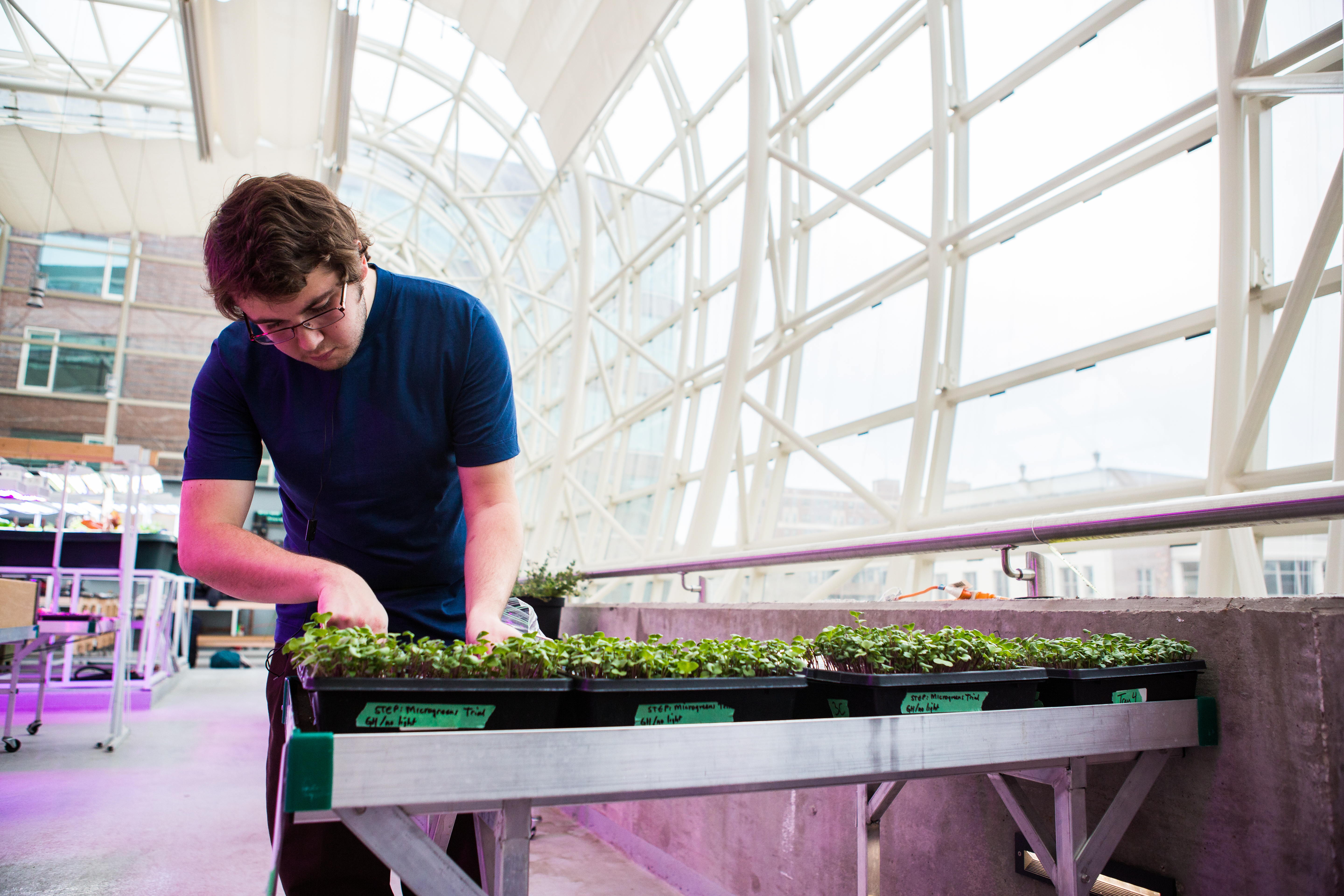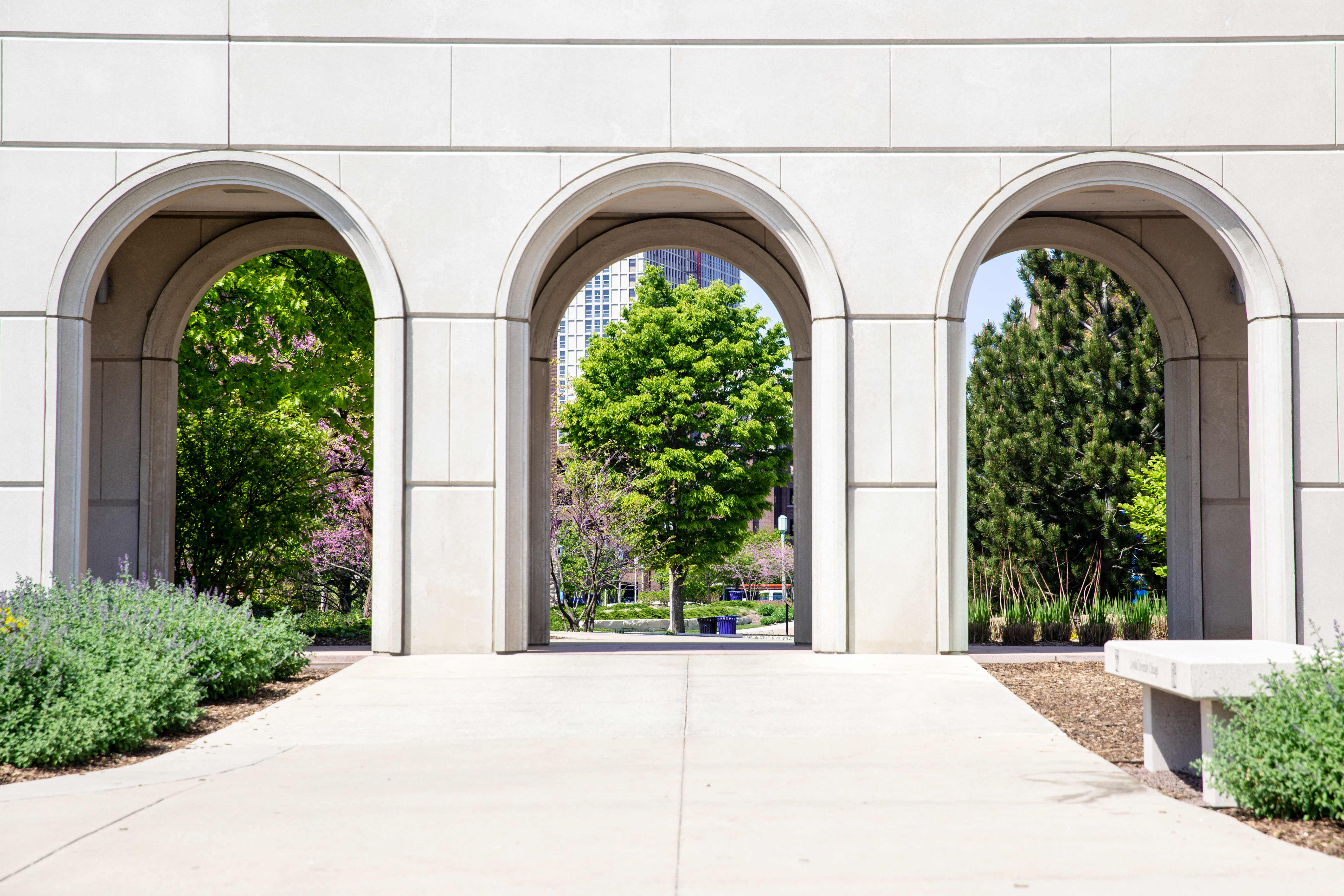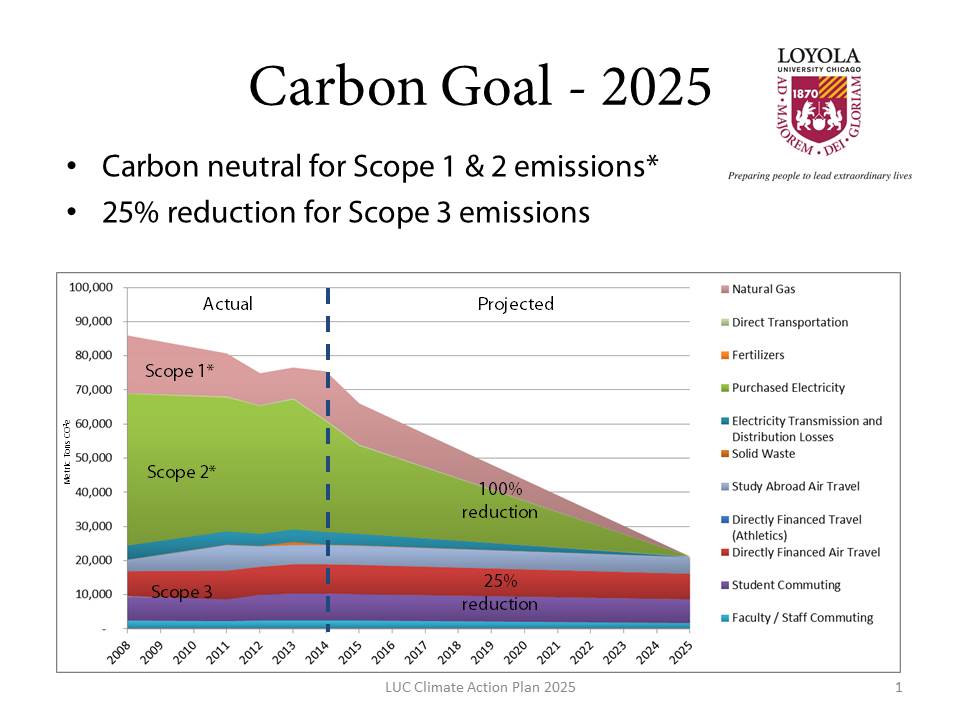Climate Action
Loyola University Chicago is working to address climate change as part of it’s social justice mission. This site brings Loyola’s climate change efforts into one location. To suggest an addition please contact the Office of Sustainability.

Climate Action Plan
In 2015, Loyola codified its commitment to climate action by adopting A Just Future, the university’s first climate action plan. This plan identifies actions to mitigate, adapt, sequester, educate, and engage around climate change ultimately leading to carbon neutrality by 2025.
Loyola is well on its way to meeting this goal and you can find all annual greenhouse gas inventories provided on the SIMAP reporting platform. A summary of Loyola's most recent inventory can be found here: FY22 LUC Carbon Footprint.
Research and Academics
Climate change has influenced nearly every discipline at this point as we observe the impacts of an altered climate and work to understand policies, communications, and responses to address this challenge. Faculty in business are helping companies make their supply chains more efficient and reducing risks from vendors in far flung corners of the globe. Researchers in Psychology are understanding the identities and strategies that lead to eco-friendly behavior change. Ecologists are understanding how changing climates are impacting the ranges of the species they study and which are vulnerable to extinction.
The core curriculum requires all undergraduate students to undertake scientific literacy courses to understand and question our process of learning and how science creates new understanding of global natural and human-influenced systems making all Loyola graduates “climate-literate”.

Engagement
Nearly half of all incoming freshmen choose Loyola because of its commitment to sustainability and this includes our on-campus dialogue on how to respond to a human-caused climate change. With speakers, films, student organizations, learning communities, and other campus-wide activities, our students are encouraged to understand the science behind the issue and the complexities behind the policies and politics of climate change.
Each year, the School of Environmental Sustainability hosts a large conference on a different aspect of the climate change topic. Bringing major speakers to campus as well as highlighting on-campus efforts to address climate. This conference is open to the larger community and serves as a common ground for colleagues at other Jesuit universities and institutions to meet and address climate change from this perspective.
AJCU Footprint
Loyola has partnered with fellow Jesuit colleges and universities in the United States to calculate our shared greenhouse gas footprint and explore options to reduce our contributions to climate change. A summary of this project is available here: AJCU 2017 The Climate on Campus GHG Summary.
Mitigation
In 2012, then President Fr. Michael Garanzini signed Loyola onto the President’s Climate Commitment. This commitment states that Loyola will track its greenhouse gas emissions, draft and adopt a climate action plan, and undertake a series of climate actions right away. Loyola has been reporting its carbon emissions ever since and has seen significant reductions year over year even as square footage and student population has increased. A commitment to energy efficiency, high-performing buildings and clean energy continues to advance Loyola’s campus climate action.
A useful framework for prioritizing carbon emissions reductions was released in 2017 as Project Drawdown. Loyola has analyzed its emissions reductions efforts against this set of solutions and provided this summary report: Project Drawdown LUC Summary 2022.

Adaptation
As an aspect of our 2014 climate planning process, Loyola has considered the impact of a changing climate on our campuses and community. Two documents detail the anticipated impacts of climate change and summarize actions taken to date. A student project in 2018 created a draft Resilience Plan for the university engaging stakeholders such as Facilities and Campus Safety.
Finance and Endowment
Loyola’s investments also play an important role in affecting the global climate and sustainable communities. In 2021, Loyola’s Board of Trustees adopted the Sustainable Investment Policy to transition from fossil fuel investments to carbon-free options.
Awards
Loyola has been recognized for our aggressive approach to climate change. Recent awards include two Climate Leadership Awards; Association of Catholic College and Universities bestowed their first ever climate award to Loyola (2016) and Second Nature / US Green Building Council recognized Loyola with their 2017 Climate Leadership Award. For a full list of recognitions and awards please follow this link.
Loyola University Chicago is working to address climate change as part of it’s social justice mission. This site brings Loyola’s climate change efforts into one location. To suggest an addition please contact the Office of Sustainability.
Climate Action Plan
In 2015, Loyola codified its commitment to climate action by adopting A Just Future, the university’s first climate action plan. This plan identifies actions to mitigate, adapt, sequester, educate, and engage around climate change ultimately leading to carbon neutrality by 2025.
Loyola is well on its way to meeting this goal and you can find all annual greenhouse gas inventories provided on the SIMAP reporting platform. A summary of Loyola's most recent inventory can be found here: FY22 LUC Carbon Footprint.
Research and Academics
Climate change has influenced nearly every discipline at this point as we observe the impacts of an altered climate and work to understand policies, communications, and responses to address this challenge. Faculty in business are helping companies make their supply chains more efficient and reducing risks from vendors in far flung corners of the globe. Researchers in Psychology are understanding the identities and strategies that lead to eco-friendly behavior change. Ecologists are understanding how changing climates are impacting the ranges of the species they study and which are vulnerable to extinction.
The core curriculum requires all undergraduate students to undertake scientific literacy courses to understand and question our process of learning and how science creates new understanding of global natural and human-influenced systems making all Loyola graduates “climate-literate”.
Engagement
Nearly half of all incoming freshmen choose Loyola because of its commitment to sustainability and this includes our on-campus dialogue on how to respond to a human-caused climate change. With speakers, films, student organizations, learning communities, and other campus-wide activities, our students are encouraged to understand the science behind the issue and the complexities behind the policies and politics of climate change.
Each year, the School of Environmental Sustainability hosts a large conference on a different aspect of the climate change topic. Bringing major speakers to campus as well as highlighting on-campus efforts to address climate. This conference is open to the larger community and serves as a common ground for colleagues at other Jesuit universities and institutions to meet and address climate change from this perspective.
AJCU Footprint
Loyola has partnered with fellow Jesuit colleges and universities in the United States to calculate our shared greenhouse gas footprint and explore options to reduce our contributions to climate change. A summary of this project is available here: AJCU 2017 The Climate on Campus GHG Summary.
Mitigation
In 2012, then President Fr. Michael Garanzini signed Loyola onto the President’s Climate Commitment. This commitment states that Loyola will track its greenhouse gas emissions, draft and adopt a climate action plan, and undertake a series of climate actions right away. Loyola has been reporting its carbon emissions ever since and has seen significant reductions year over year even as square footage and student population has increased. A commitment to energy efficiency, high-performing buildings and clean energy continues to advance Loyola’s campus climate action.
A useful framework for prioritizing carbon emissions reductions was released in 2017 as Project Drawdown. Loyola has analyzed its emissions reductions efforts against this set of solutions and provided this summary report: Project Drawdown LUC Summary 2022.
Adaptation
As an aspect of our 2014 climate planning process, Loyola has considered the impact of a changing climate on our campuses and community. Two documents detail the anticipated impacts of climate change and summarize actions taken to date. A student project in 2018 created a draft Resilience Plan for the university engaging stakeholders such as Facilities and Campus Safety.
Finance and Endowment
Loyola’s investments also play an important role in affecting the global climate and sustainable communities. In 2021, Loyola’s Board of Trustees adopted the Sustainable Investment Policy to transition from fossil fuel investments to carbon-free options.
Awards
Loyola has been recognized for our aggressive approach to climate change. Recent awards include two Climate Leadership Awards; Association of Catholic College and Universities bestowed their first ever climate award to Loyola (2016) and Second Nature / US Green Building Council recognized Loyola with their 2017 Climate Leadership Award. For a full list of recognitions and awards please follow this link.

